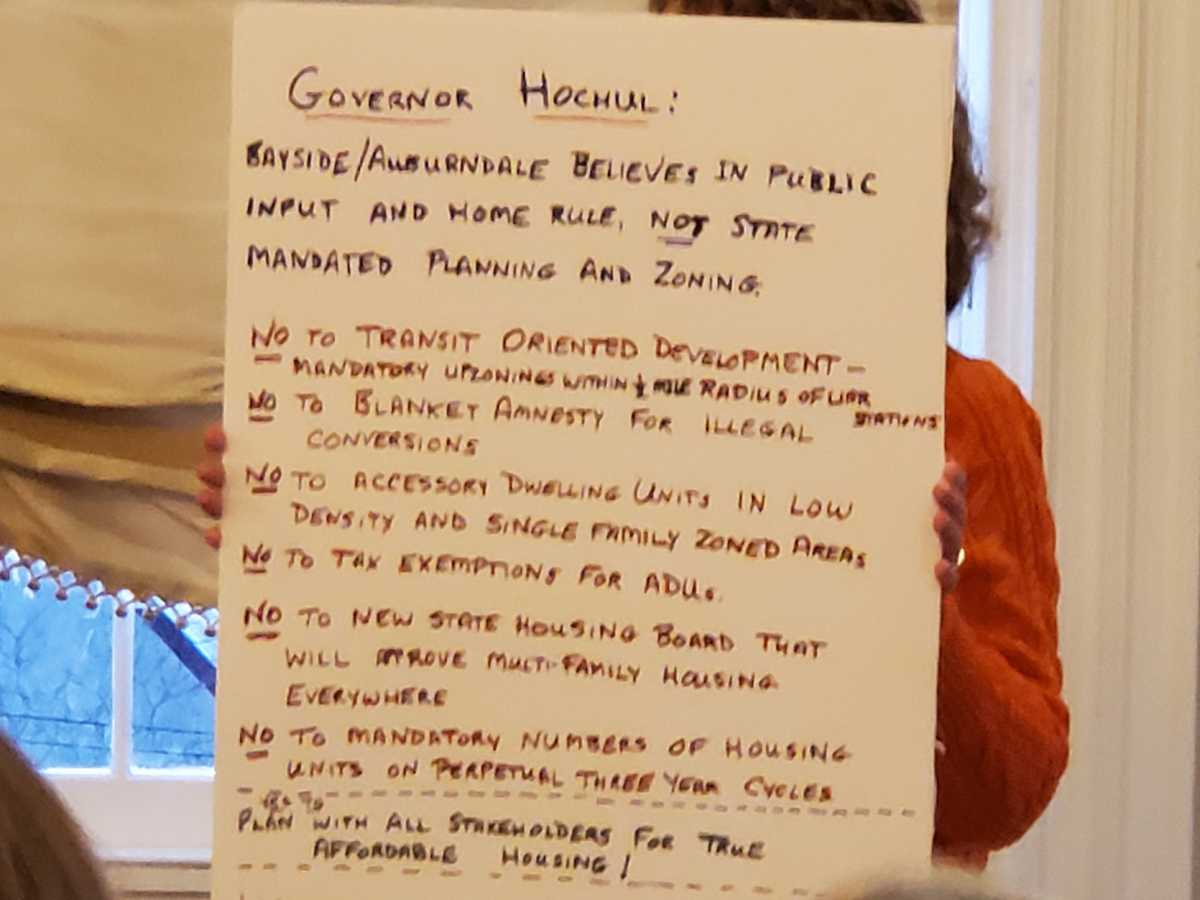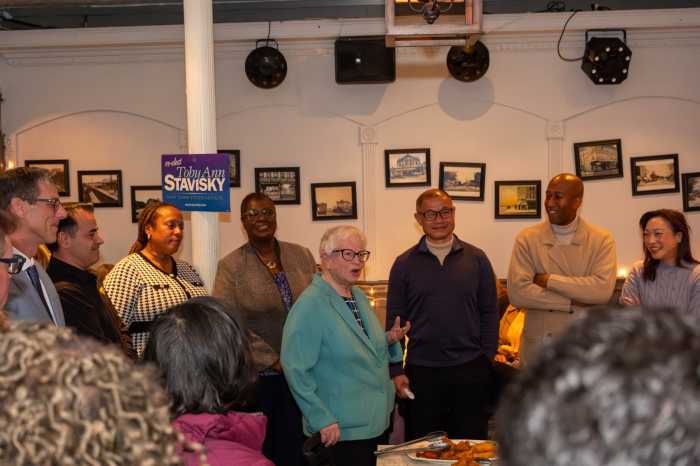Nearly 200 community members and leaders from across Long Island, New York City and Westchester gathered at the Douglaston Club on Friday, Feb. 24, to express their opposition to land use bills that Gov. Kathy Hochul included in the latest state budget proposal. The rally featured more than 20 speakers expressing their outrage over the bills’ inclusion and discussing what can be done to eliminate it.
The issue that has residents up in arms is the New York Housing Compact, which calls for the construction of 800,000 new homes across the state over the next decade. New York City residents had recently successfully fought against a 2021 proposal by former City Council Speaker Corey Johnson that would’ve required an increase in high-density housing each decade. Additionally, in 2022, residents of the state were successful in fighting against Hochul’s effort to eliminate single-family housing and providing blanket amnesty for illegal building conversions across the city.
According to urban planner Paul Graziano, nearly the entire city organized against Johnson’s proposal, leading to it being thrown out. Hochul’s 2022 proposal to eliminate single-family zoning across the state and allowing accessory dwelling units to be built on single-family properties across the state was very concerning as well. That proposal also called for all Metro-North and Long Island Rail Road stations outside the city to create transit oriented development zones, which would have up-zoned those areas.
“We organized and got our elected [officials] to turn around on this and they got [Governor Hochul] to pull out almost all of it before the deadline [of the budget negotiations],” Graziano said. “This Jan. 7, she came out with a plan arguably worse. This plan is to increase development and housing in every city, town, village or county in the state of New York every three years. But if you don’t meet those numbers, a new state board will allow development to locate anywhere they want. In addition, the blanket amnesty for illegal conversions in the city once again and, more importantly, the transit oriented development not only would affect Long Island Rail Road and Metro-North, but all subway and railroad stations across the state that’s controlled by the Metropolitan Transit Authority.”
Under this proposal, the transit oriented development would call for a minimum of 50 units per acre. This would be within a half-mile radius of the train stations. For an area like Douglaston, this would pose an immense increase in transit oriented development, as it currently has seven units per acre.
“This is an existential threat to our communities,” Graziano said. “This is as nonpartisan as it gets. This is us, civic people and elected officials who support us. We must stop this permanently, as this is not the way to govern. The way to govern is to work with communities at the local level. To mandate density with no rhyme or reason is insane. It is not appropriate.”
Queens Civic Congress President Warren Schreiber expressed concern that moving people into basement apartments or accessory dwelling units rather than creating more affordable housing units would create substandard and dangerous residences for some of the most vulnerable people. He urged those in attendance to reach out to their elected officials in order to try to get them in opposition of the bills.
“Transit oriented development will overwhelm critical infrastructure, police, fire and medical care,” Schreiber said. “The New York State Housing Compact is not a rezoning; it’s a poison pill that will destroy residential neighborhoods. I urge everyone to return to the drawing board for a plan that actually solves the housing crisis.”
Prior to the meeting, Queens Assemblyman Edward Braunstein released a statement declaring his opposition to the housing proposal. While he acknowledged the state was in need of more affordable housing, Braunstein said localities shouldn’t need to be threatened with mandates in order to try to achieve this.
“The state should be offering local governments incentives to build housing,” Braunstein said. “As it stands, the governor’s proposals would increase density without taking into consideration the impact new construction would have on infrastructure and local service delivery. I am resolute that local governments should retain their decision-making authority over these matters. The Assembly is currently in the process of developing its ‘One-House’ state budget proposal in response to the governor’s Executive Budget. As chair of the Cities Committee, I will continue working closely with my colleagues in the state Legislature and Governor Hochul to address housing needs while respecting local zoning laws and authorities.”
In addition to Braunstein, some of the Queens elected officials who have declared their opposition to this proposal include Councilwoman Vickie Paladino, Assemblywoman Alicia Hyndman and state Senators Toby Ann Stavisky and Leroy Comrie. March 2 will mark the 30-day amendment deadline for Hochul to voluntarily remove the proposal from the budget bill. Due to the large amount of opposition from New York state residents and elected leaders in 2022, she ended up removing last year’s proposal on the 30th day.
A Change.org petition was created to try and rally the community in opposition of the proposal. As of Feb. 28, the petition has received nearly 1,350 signatures, with a goal of 1,500. The description of the petition also includes the many reasons as to why the those who created and signed it are in opposition to the Housing Compact proposal.


































